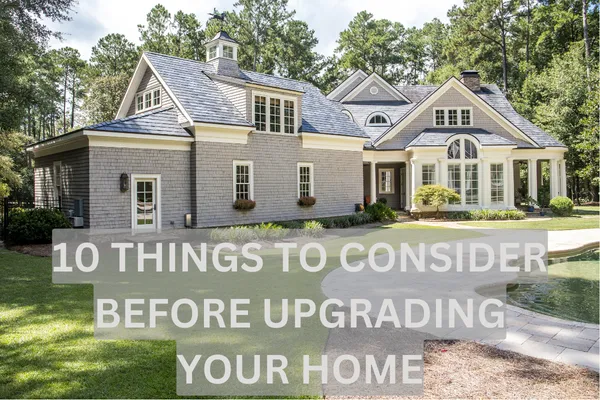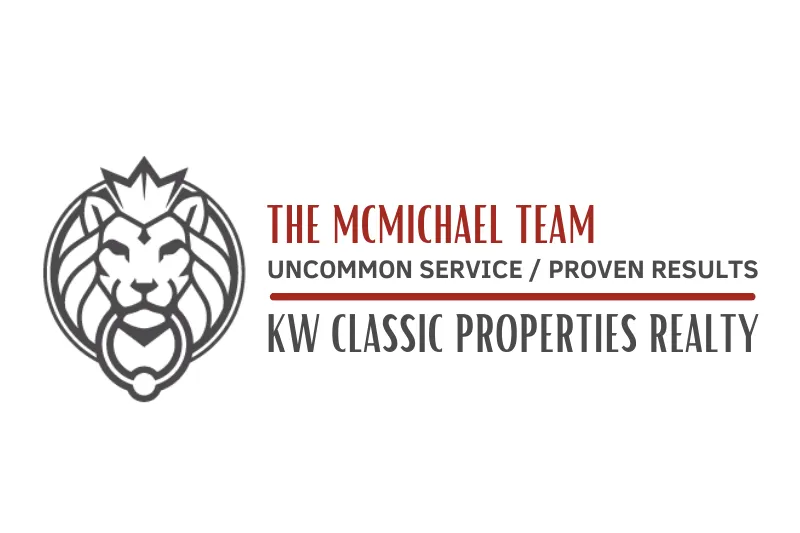Recent Posts

10 Things to Consider Before Upgrading to a Larger Home
“The ultimate luxury is being able to relax and enjoy your home.” - Jeff Lincoln
Introduction:
The prospect of moving into a larger home is often accompanied by excitement and anticipation. However, this significant decision requires thorough consideration. Before making the leap to a more substantial residence, it's essential to delve into various crucial factors to ensure a seamless transition and a fulfilling experience.

Does your current living space accommodate a growing family?
Evaluate Your Current Needs
Assessing Your Current Living Situation
Start by closely examining your existing living arrangement. Assess whether your current home genuinely feels cramped or if there are opportunities to optimize the layout more efficiently. This self-reflection can help you identify if the need for a larger home is genuine.
Identifying Specific Needs and Goals
Consider the specific factors driving your desire for more space. Is it the need for an extra bedroom to accommodate a growing family? Perhaps a larger kitchen for culinary endeavors? Identifying these specific needs and goals will guide your search for a larger home tailored to your lifestyle.
Budget and Financial Readiness
Determine Your Budget
Establishing a well-defined budget is paramount when considering an upgrade to a larger home. It's not just about the purchase price; you must also account for additional expenses, including property taxes, insurance, and potential renovations. Ensuring your budget aligns with your long-term financial goals is crucial.
Consider Mortgage Options
Delve into various mortgage options available to you. Analyze interest rates, down payment requirements, and loan terms to find a mortgage solution that aligns with your financial situation. Consulting a financial advisor or mortgage specialist can provide valuable insights.
Home Equity and Existing Mortgage
Understanding Your Home Equity
If you currently own a home, evaluate the amount of equity you've built over time. Home equity can be a valuable asset, serving as a substantial down payment for your larger home. Understanding your equity position is essential when planning your upgrade.
Options for Handling Your Existing Mortgage
Deciding what to do with your existing mortgage is a critical step. You can choose to sell your current home and pay off the mortgage, or explore options like renting it out if it aligns with your financial strategy. Each choice has its implications, and careful consideration is necessary.
Long-term Goals
Consider Your Long-term Objectives
Think beyond immediate needs. Reflect on your long-term life objectives, such as family expansion, retirement plans, or potential investments. Evaluate how a larger home fits into these overarching goals.
How a Larger Home Fits into Your Plans
Ensure that upgrading to a larger home aligns seamlessly with your long-term objectives. It should be a decision that contributes positively to your financial stability and overall well-being, supporting your future aspirations.
Location Matters
The Significance of Location
Location plays a pivotal role in your quality of life. Examine the neighborhoods you're interested in, considering factors like proximity to your workplace, access to quality schools, availability of essential amenities, and ease of commute.
Proximity to Work, Schools, and Amenities
Select a location that offers convenience and meets your family's needs. Proximity to your workplace can reduce commuting stress, quality schools can provide an excellent education for your children, and easy access to amenities can enhance your daily life.
Maintenance and Upkeep
The Implications of a Larger Home
Understand that a larger home may entail increased maintenance and upkeep responsibilities. It's vital to consider whether you're prepared for the additional time and effort required to maintain a larger property.
The Commitment to Maintenance
Factor in the time and financial commitment needed for regular maintenance, including landscaping, repairs, and higher utility costs. Adequate preparation can prevent surprises and ensure you maintain your new home effectively.
Future Expenses
Anticipate Future Costs
As you plan for your larger home, anticipate future expenses. Account for potential costs related to home renovations or upgrades. Budgeting for these expenses will prevent financial strain down the road.
Preparing for Unexpected Expenses
It's wise to establish an emergency fund to cover unexpected expenses, such as major repairs or unforeseen medical bills. Having this financial safety net in place can provide peace of mind during your homeownership journey.
Resale Value
How Upgrading Affects Resale Value
Consider how upgrading to a larger home may impact its resale value. Choose features and improvements that not only enhance your current lifestyle but also have a positive influence on the property's future marketability.
Investment Potential
View your larger home as an investment. Aim to make choices that not only fulfill your immediate needs but also increase the property's value over time. Strategic decisions can lead to a financially rewarding homeownership experience.
Emotional Considerations
Emotional Attachment to Your Current Home
Recognize that leaving your current home may come with emotional attachments. Preparing yourself and your family for the emotional aspects of moving is essential. Open conversations can help ease the emotional transition.
Preparing Emotionally for the Transition
Discuss the move with your family and address any emotional concerns or sentimental attachments to your current home. Creating a positive outlook and focusing on the opportunities of the new home can make the transition smoother.
Timing and Market Conditions
Timing Your Upgrade
Consider the timing of your upgrade in conjunction with market conditions and your personal circumstances. Assess whether the current market presents favorable conditions for purchasing a larger home.
Market Conditions and Trends
Stay informed about local real estate market conditions and trends. Timing your purchase during a favorable market period can have a significant impact on the value and affordability of your new home.
Consider Alternative Solutions
Explore Renovation Options
Before committing to a larger home, explore renovation options for your current property. Remodeling or expanding your existing space might effectively fulfill your needs in a more cost-effective manner.
Weighing the Pros and Cons
Evaluate the pros and cons of upgrading versus renovating. Consider factors like cost, disruption to your daily life, and the overall impact on your lifestyle when deciding between the two options.
Consult with a Real Estate Agent
The Value of Professional Guidance
Consult with a reputable real estate agent who possesses a deep understanding of the local market. They can provide valuable insights, help you find suitable properties that match your criteria, and negotiate on your behalf to secure the best deal.
Leveraging the Expertise of an Agent
Real estate agents bring extensive knowledge of market dynamics, negotiation skills, and access to listings that may not be publicly available. Their expertise streamlines the home-buying process and increases the likelihood of a successful upgrade.
Visit Potential Homes
Attend Open Houses
Actively engage in the search process by attending open houses or scheduling private showings of potential homes. This hands-on approach allows you to experience the properties firsthand and assess their suitability.
Virtual Tours and Inspections
Incorporate virtual tours and inspections into your property search, especially if visiting homes in person isn't feasible. Technology enables you to explore properties remotely, offering a comprehensive view of the available options.
Conclusion
Upgrading to a larger home is a substantial decision that has the potential to significantly improve your quality of life. To ensure a successful transition, take the time to consider these ten essential factors thoroughly. By evaluating your needs, financial readiness, location preferences, and emotional preparedness, seeking guidance from a real estate agent, and exploring alternative solutions, you can make an informed decision that aligns perfectly with your aspirations.
FAQs (Frequently Asked Questions)
What factors should I consider when upgrading to a larger home?
Consider factors like your current needs, budget, location, maintenance requirements, long-term goals, and the emotional aspects of the move.How can I determine my budget for a larger home?
Determine your budget by assessing your finances, considering mortgage options, and accounting for additional costs like taxes and insurance.What should I do with my existing mortgage when upgrading?
You can choose to pay off your existing mortgage, sell your current home, or explore options like renting it out.Is location more important than the size of the home?
Location is essential for your quality of life, so it's crucial to find a balance between location and the size of the home that suits your needs.How can a real estate agent help with the upgrade process?
A real estate agent can provide market insights, help you find suitable properties, negotiate on your behalf, and make the entire process more efficient and successful.
Recent Posts

10 Things to Consider Before Upgrading to a Larger Home
“The ultimate luxury is being able to relax and enjoy your home.” - Jeff Lincoln
Introduction:
The prospect of moving into a larger home is often accompanied by excitement and anticipation. However, this significant decision requires thorough consideration. Before making the leap to a more substantial residence, it's essential to delve into various crucial factors to ensure a seamless transition and a fulfilling experience.

Does your current living space accommodate a growing family?
Evaluate Your Current Needs
Assessing Your Current Living Situation
Start by closely examining your existing living arrangement. Assess whether your current home genuinely feels cramped or if there are opportunities to optimize the layout more efficiently. This self-reflection can help you identify if the need for a larger home is genuine.
Identifying Specific Needs and Goals
Consider the specific factors driving your desire for more space. Is it the need for an extra bedroom to accommodate a growing family? Perhaps a larger kitchen for culinary endeavors? Identifying these specific needs and goals will guide your search for a larger home tailored to your lifestyle.
Budget and Financial Readiness
Determine Your Budget
Establishing a well-defined budget is paramount when considering an upgrade to a larger home. It's not just about the purchase price; you must also account for additional expenses, including property taxes, insurance, and potential renovations. Ensuring your budget aligns with your long-term financial goals is crucial.
Consider Mortgage Options
Delve into various mortgage options available to you. Analyze interest rates, down payment requirements, and loan terms to find a mortgage solution that aligns with your financial situation. Consulting a financial advisor or mortgage specialist can provide valuable insights.
Home Equity and Existing Mortgage
Understanding Your Home Equity
If you currently own a home, evaluate the amount of equity you've built over time. Home equity can be a valuable asset, serving as a substantial down payment for your larger home. Understanding your equity position is essential when planning your upgrade.
Options for Handling Your Existing Mortgage
Deciding what to do with your existing mortgage is a critical step. You can choose to sell your current home and pay off the mortgage, or explore options like renting it out if it aligns with your financial strategy. Each choice has its implications, and careful consideration is necessary.
Long-term Goals
Consider Your Long-term Objectives
Think beyond immediate needs. Reflect on your long-term life objectives, such as family expansion, retirement plans, or potential investments. Evaluate how a larger home fits into these overarching goals.
How a Larger Home Fits into Your Plans
Ensure that upgrading to a larger home aligns seamlessly with your long-term objectives. It should be a decision that contributes positively to your financial stability and overall well-being, supporting your future aspirations.
Location Matters
The Significance of Location
Location plays a pivotal role in your quality of life. Examine the neighborhoods you're interested in, considering factors like proximity to your workplace, access to quality schools, availability of essential amenities, and ease of commute.
Proximity to Work, Schools, and Amenities
Select a location that offers convenience and meets your family's needs. Proximity to your workplace can reduce commuting stress, quality schools can provide an excellent education for your children, and easy access to amenities can enhance your daily life.
Maintenance and Upkeep
The Implications of a Larger Home
Understand that a larger home may entail increased maintenance and upkeep responsibilities. It's vital to consider whether you're prepared for the additional time and effort required to maintain a larger property.
The Commitment to Maintenance
Factor in the time and financial commitment needed for regular maintenance, including landscaping, repairs, and higher utility costs. Adequate preparation can prevent surprises and ensure you maintain your new home effectively.
Future Expenses
Anticipate Future Costs
As you plan for your larger home, anticipate future expenses. Account for potential costs related to home renovations or upgrades. Budgeting for these expenses will prevent financial strain down the road.
Preparing for Unexpected Expenses
It's wise to establish an emergency fund to cover unexpected expenses, such as major repairs or unforeseen medical bills. Having this financial safety net in place can provide peace of mind during your homeownership journey.
Resale Value
How Upgrading Affects Resale Value
Consider how upgrading to a larger home may impact its resale value. Choose features and improvements that not only enhance your current lifestyle but also have a positive influence on the property's future marketability.
Investment Potential
View your larger home as an investment. Aim to make choices that not only fulfill your immediate needs but also increase the property's value over time. Strategic decisions can lead to a financially rewarding homeownership experience.
Emotional Considerations
Emotional Attachment to Your Current Home
Recognize that leaving your current home may come with emotional attachments. Preparing yourself and your family for the emotional aspects of moving is essential. Open conversations can help ease the emotional transition.
Preparing Emotionally for the Transition
Discuss the move with your family and address any emotional concerns or sentimental attachments to your current home. Creating a positive outlook and focusing on the opportunities of the new home can make the transition smoother.
Timing and Market Conditions
Timing Your Upgrade
Consider the timing of your upgrade in conjunction with market conditions and your personal circumstances. Assess whether the current market presents favorable conditions for purchasing a larger home.
Market Conditions and Trends
Stay informed about local real estate market conditions and trends. Timing your purchase during a favorable market period can have a significant impact on the value and affordability of your new home.
Consider Alternative Solutions
Explore Renovation Options
Before committing to a larger home, explore renovation options for your current property. Remodeling or expanding your existing space might effectively fulfill your needs in a more cost-effective manner.
Weighing the Pros and Cons
Evaluate the pros and cons of upgrading versus renovating. Consider factors like cost, disruption to your daily life, and the overall impact on your lifestyle when deciding between the two options.
Consult with a Real Estate Agent
The Value of Professional Guidance
Consult with a reputable real estate agent who possesses a deep understanding of the local market. They can provide valuable insights, help you find suitable properties that match your criteria, and negotiate on your behalf to secure the best deal.
Leveraging the Expertise of an Agent
Real estate agents bring extensive knowledge of market dynamics, negotiation skills, and access to listings that may not be publicly available. Their expertise streamlines the home-buying process and increases the likelihood of a successful upgrade.
Visit Potential Homes
Attend Open Houses
Actively engage in the search process by attending open houses or scheduling private showings of potential homes. This hands-on approach allows you to experience the properties firsthand and assess their suitability.
Virtual Tours and Inspections
Incorporate virtual tours and inspections into your property search, especially if visiting homes in person isn't feasible. Technology enables you to explore properties remotely, offering a comprehensive view of the available options.
Conclusion
Upgrading to a larger home is a substantial decision that has the potential to significantly improve your quality of life. To ensure a successful transition, take the time to consider these ten essential factors thoroughly. By evaluating your needs, financial readiness, location preferences, and emotional preparedness, seeking guidance from a real estate agent, and exploring alternative solutions, you can make an informed decision that aligns perfectly with your aspirations.
FAQs (Frequently Asked Questions)
What factors should I consider when upgrading to a larger home?
Consider factors like your current needs, budget, location, maintenance requirements, long-term goals, and the emotional aspects of the move.How can I determine my budget for a larger home?
Determine your budget by assessing your finances, considering mortgage options, and accounting for additional costs like taxes and insurance.What should I do with my existing mortgage when upgrading?
You can choose to pay off your existing mortgage, sell your current home, or explore options like renting it out.Is location more important than the size of the home?
Location is essential for your quality of life, so it's crucial to find a balance between location and the size of the home that suits your needs.How can a real estate agent help with the upgrade process?
A real estate agent can provide market insights, help you find suitable properties, negotiate on your behalf, and make the entire process more efficient and successful.

1349 W. Lane Ave, Suite 1125, Columbus, OH, 43221
(614) 769-7766
(614) 768-6531
www.livingincolumbus.com





